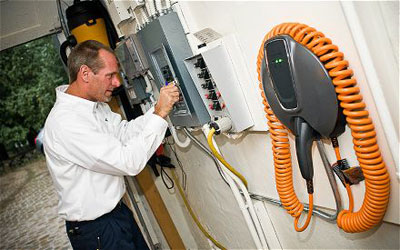
and Inspections for Electric Vehicle Chargers
 Since May of 2011, ICC's Government Relations staff has been engaged with the Clean Cities office at the U.S. Department of Energy (DOE) to discuss collaboration to advance the safe installation of Electric Vehicle (EV) battery chargers in residential settings. The equipment is generally referred to as Electric Vehicle Supply Equipment, or EVSE.
Since May of 2011, ICC's Government Relations staff has been engaged with the Clean Cities office at the U.S. Department of Energy (DOE) to discuss collaboration to advance the safe installation of Electric Vehicle (EV) battery chargers in residential settings. The equipment is generally referred to as Electric Vehicle Supply Equipment, or EVSE.
Prior to that, ICC joined in the ANSI Electric Vehicle Standards Panel (EVSP) to ensure that the perspective of code officials and inspectors was reflected in the Standards Roadmap that ANSI had pledged to produce to guide U.S. efforts to widely deploy electric vehicles and support infrastructure. Bruce Johnson, ICC’s Director of Fire Service Activities, and David Karmol, ICC’s Vice President for Federal and External Affairs, have been involved in both initiatives to represent the interests of ICC members.
The two complimentary efforts recently came together as ICC GR worked with NFPA, the International Association of Electrical Inspectors (IAEI), and the National Electrical Contractors Association (NECA) to convince the Department of Energy to recognize the importance of the well-established system of trained installers, local permits, and on-site inspections to assure safe installations of the new EVSE’s to support plug-in electric vehicles.
Last summer, the DOE Clean Cities program issued a template on their website, intended for local code official use that reflected the requirements of the National Electric Code, but suggested that the electrical contractor installing EVSE could “self-certify” his own installation of this new charging equipment in residential garages.
To convince DOE officials to remove the “self-certification” option, ICC worked with its partners NFPA, IAEI, and NECA and others on the ANSI EVSP to develop language addressing safe EVSE installation in residential settings. The language approved by the ANSI panel affirmed the traditional three part formula for safe construction: certified and labeled equipment installed by qualified personnel, locally appropriate pre-installation permits, and post-installation inspection by qualified building/electrical inspectors.
Following publication of the ANSI EVSP Roadmap document in April, 2012, ICC requested another meeting with DOE Clean Cities leadership to discuss the Roadmap recommendations, and urge DOE to embrace the procedure recommended by the groups involved in the Roadmap, to assure safe deployment of EVSE. ICC pointed out the importance of having an independent inspection following installation, and reminded officials of the potential for negative publicity that would surely accompany any fire, explosion, or other accident involving the new high-voltage electric vehicle battery-charging equipment.
In mid-June, after several conversations with all of the private sector associations maintaining a unified position supporting permits and inspections as a part of the rollout process DOE Clean Cities officials notified the group that they intended to revise the DOE template, and remove the recommendation for self-certification from the template. In return, all the groups indicated that they would assist in widely disseminating information from DOE to local officials and members looking for guidance in installing, permitting and inspecting EVSE installations.
The new DOE template is now available on the DOE website at:
http://www.afdc.energy.gov/afdc/vehicles/electric_deployment.html